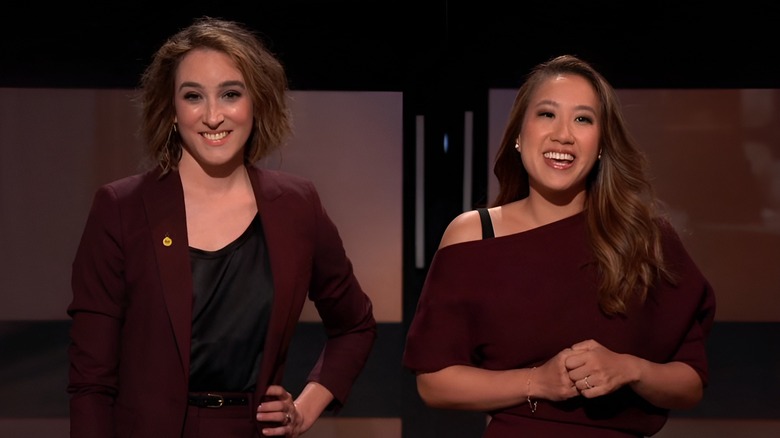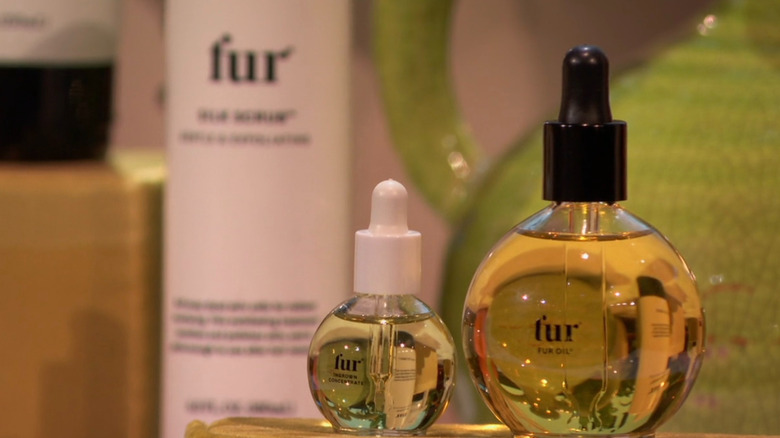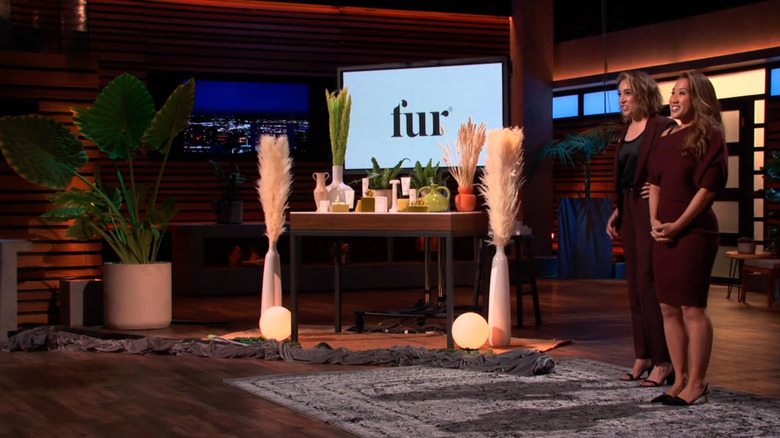Whatever Happened To Fur After Shark Tank?
Talking about the hair down is seen as taboo by many, but two trailblazing entrepreneurs are looking to alter this mindset for the better with their business, simply called Fur. The company creates a line of all-natural pubic hair care products including oils, lotions, scrubs, wipes, and brushes. Fur's creators hope to use their brand to uplift individuals and challenge traditionally off-kilter conversations about our bodies.
Co-founder Laura Schubert came up with Fur after talking with her family about their body hair care routine and failing to find products for her needs. Throughout 2014, she developed her own brand to combat the stigma around pubic hair maintenance alongside her close friend and fellow Harvard grad Lillian Tung. As can be imagined, trying to pitch an idea like Fur was a difficult endeavor, to say the least. While still working through product development, their idea was rejected by the many formulators and retailers they had tried contacting.
As time went on, the team struck gold through some lucky occurrences. The business officially launched in 2016 and would start seeing a steady lineup of retailers partner with the company such as Shen Beauty, Revolve, Urban Outfitters, and Goop. Awareness of the brand soared when it started getting big-time press, most notably with an Into the Gloss interview about Emma Watson's beauty routine where the "Harry Potter" star sang the praises of Fur and its products. This led to an explosion in sales, with Fur's year-long inventory getting sold out in a jaw-dropping three weeks. With a peculiarly promising venture on their hands, it wouldn't take long for the creators of Fur to find themselves on "Shark Tank."
What happened to Fur on Shark Tank?
Laura Schubert and Lillian Tung appear on "Shark Tank" Season 11 seeking $500,000 for 2.5% of Fur. Between the jaw-dropping valuation and the business pitch itself, it's clear that the sharks are left in somewhat of a daze.
Daymond John wants to know the benefit of using oils on one's nether regions. The two explain that treating these parts in the same way you'd treat head or face hair severely cuts down on issues such as razor burns and ingrown hairs. Few companies have attempted such a product, given the taboo subject matter. They've invested $500,000 of their life savings into the venture and have no debt or other investors. Fur's lifetime sales are $3.5 million and they are on track to hit $5 million by year's end. This is supported by their margins, as their typical products cost $7.63 on average to produce and sell for $37. O'Leary is in love with the business, but still questions the valuation, to which Schubert explains that it's common for beauty companies to sell up to six times their revenue.
John makes the first offer for $500,000 at a 15% equity stake, although he later drops it when the duo refuses to come down from their initial valuation. O'Leary goes in for the original offer but wants $1 in royalties until he makes back $1 million. Lori Greiner proposes the $500,000 for 12% along with giving $50,000 to a charity that lines up with Fur's mission of body acceptance and positivity. After some back-and-forth, Greiner brings her stake down to 8% and the deal is made.
Fur after Shark Tank
Fur's "Shark Tank" episode aired on February 28, 2020, alongside other companies such as Bala Bangles and Pips and Bounce. Co-founders Laura Schubert and Lillian Tung came prepared for the sudden surge of business they'd experience following "Shark Tank," but were nevertheless pleasantly surprised by the newfound audience. "There was definitely increased sales and traffic to our website for sure," Schubert said in an interview with the New York Launch Podcast. "And again, we just think that having the opportunity to get in front of that many people seeing the comments, oh I've never heard of this, you know, this is so great. Like that was, you know that was a really powerful thing for us."
Their deal with investor Lori Greiner did not get closed, judging from the lack of representation the company has on her website. This is a common occurrence in the aftermath of "Shark Tank," especially for Greiner's deals, as further due diligence and negotiations can result in either side deciding to back out. Nevertheless, Fur hit its stride even as the COVID-19 pandemic set in, increasing its staff and expanding to different shopping platforms to further build its audience.
Is Fur still in business?
Fur's line of products is too long to list. From stubble creams and deodorants to ingrown hair serums and hair trimmers, you'd be hard-pressed to not find what you need from the company's catalog. Of course, Fur's website is the most comprehensive spot to learn everything you could want to know about its lineup, but its items are available through a myriad of other outlets including Amazon, Ulta Beauty, Goop, Macy's, and Walmart, to name a few.
Customers have been largely satisfied with Fur judging from the overwhelmingly positive reviews on both its website and Amazon. On the latter platform, Fur's signature hair oil holds a 4.3 out of 5-star average rating based on over 4,700 reviews. Users are in love with its ability to remove ingrown hairs and the nice smell, although some have complained about the $26 price point given the bottle's small size.
But that hasn't stopped Fur from expanding its audience in other places. The brand has an active presence on TikTok, Instagram, and Facebook, with over 100,000 followers on Instagram alone. Fur has also appeared in numerous high-profile publications including Popsugar, Allure Magazine, Women's Health, Forbes, Men's Journal, and many others. The company has even brought home some honored distinctions, receiving Harper Bazaar's 2023 Beauty Icon Award and Ulta Beauty's Body Brand of the Year. Fur is on track to hit $20 million in sales this year and has an estimated net worth of $30 million.
What's next for Fur?
Suffice it to say, Fur is doing pretty well for itself. Even without the aid of Lori Greiner, founders Lillian Tung and Laura Schubert have more than proven their ability to effectively grow their operation.
Fur celebrated its seventh year in business in October 2023. According to an Instagram post celebrating the occasion, the brand has grown to the point that a new Fur Oil is sold every four minutes. That's an impressive feat for any product, but given that Fur was an idea that retailers rejected for its unconventional angle, it makes the team's success all the more admirable. In April, Schubert shared a post celebrating how far the company has come, stating, "Every year, the Fur team has become bigger and stronger than the year before. There is so much growth to come and I am so grateful to the team that works together to make it all happen, and most importantly— keeps every day super fun!" The brand's undying dedication to spreading its mission of body positivity and social awareness continues to drive the team forward. Fur continues celebrating this mindset through a host of interviews celebrating self-care and social media posts calling out worldwide issues such as abortion rights.




